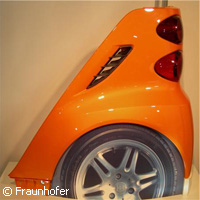PEGASUS helps Europeans spread their technical wings
Living in a fast-changing world, we have come to depend on technological advances to meet our needs. EU-funded researchers continue to push the envelope, helping people and businesses fulfil their objectives with as few headaches as possible. Enter the PEGASUS ('Integrating engineering processing and materials technologies for the European automotive sector') project, which is funded under the 'Nanotechnologies and nano-sciences, knowledge-based multifunctional materials and new production processes and devices' (NMP) Thematic area of the EU's Sixth Framework Programme (FP6) to the tune of EUR 6 million. PEGASUS has developed a new software platform geared to support automotive companies in their quest to secure faster logistics processes, novel materials and technologies, and shorter production times. Key to this innovation is that development times and costs will drop. It's crunch time for the automotive industry. With models being launched on the market at shorter intervals, products becoming ever more complex, and electric cars needing modified vehicle structures, European production sites are feeling the heat to cut costs and save money to stay competitive. The Integrated Design and Engineering Environment (IDEE) is a CAD/CAE/CAM (computer-aided design/computer-aided engineering/computer-aided manufacturing) software system linked to an intelligent database. The PEGASUS partners say IDEE assesses the functional needs of a product and identifies appropriate materials at an early stage of the development process. According to the partners, if a car roof is to be produced with a different material, for example, a new development process is not needed. Design engineers can enter the component data into the new software system, which evaluates the information and then chooses the right materials and manufacturing processes. The partners add that the platform offers engineering guidelines for tool design; these tools would help build the component. The PEGASUS team recently presented how this platform could be used on a fender with an integrated LED (light-emitting diode) tail light. 'We used the original fender from a Smart,' explains Timo Huber, a Fraunhofer Institute of Chemical Technology (ICT) scientist and PEGASUS member. 'Our project demonstrates how this complex component can be produced more quickly and cheaply with new processing techniques, materials, bonding agents and tools. Instead of conventional lamps, the project partners fitted LED tail lights to the fender. This reduced the number of separate parts from 8 to 5, and the number of processing steps from 12 to 5. Material and cost savings were also achieved by using conductor paths made of electrically conductive polymer. The conductive carbon nanotubes conduct the electricity from the connector to the LEDs and render metallic conductor structures superfluous.' The team says the components, including LED tail lights, are bonded with a special adhesive to ensure a speedy dismantling. 'In addition, we dyed the fender using newly developed pigments based on special nanoparticles,' Mr Huber says. 'We have also taken the importance of protecting the climate into account. Further developments in local fibre reinforcement of structural vehicle components will reduce weight and therefore emissions of carbon dioxide.' The IDEE system, which is still under development, is expected to be ready and available to the automotive industry in 2012. Led by the Spain's Asociacion De Investigacion De Materiales Plasticos Y Conexas Projects Unit, the PEGASUS consortium consists of experts from Belgium, Germany, Spain, France, the Netherlands, Poland, Portugal and the UK.For more information, please visit: PEGASUS:http://www.pegasus-eu.net/Fraunhofer-Gesellschaft:http://www.fraunhofer.de/en/NMP Research in FP6:http://cordis.europa.eu/nmp/whatis.htm
Countries
Belgium, Germany, Spain, France, Netherlands, Poland, Portugal, United Kingdom



